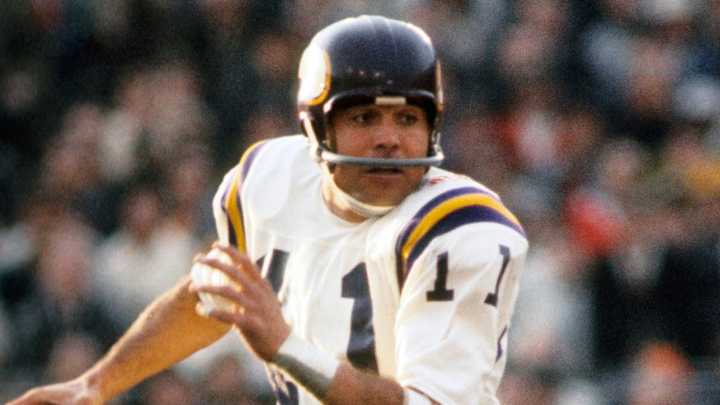Former Vikings Star QB Joe Kapp Dies at 85

Former Vikings quarterback and California football coach Joe Kapp died at the age of 85, his son J.J. Kapp confirmed to the San Francisco Chronicle on Monday. Kapp had dealt with dementia over the last 15 years.
Kapp played three seasons with the Vikings, from 1967 to ’69. In his third season, he led the team to capture the NFL championship but lost to the Chiefs in Super Bowl IV, the final Super Bowl played before the NFL and AFL merger.
During that 1969 season, Kapp etched his name in the history books as he threw seven touchdowns in a single game, tying a record that still stands today. NFL quarterbacks Peyton Manning, Nick Foles and Drew Brees have all tied the record since, joining Kapp, Sid Luckman, Adrian Burk, George Blanda and Y.A. Tittle.
Before Kapp’s NFL career, he played collegiate football at Cal. He led the Golden Bears to a Rose Bowl appearance in 1959, when they lost to Iowa. From there, he played eight seasons in the CFL. He brought the British Columbia Lions to the Grey Cup twice, making him the only quarterback in history to play in the Rose Bowl, the Grey Cup and the Super Bowl.
More than a decade after his professional playing career ended, Kapp returned to football to coach his alma mater in 1982. In his first season, Kapp stood on the sidelines during the famous “The Play” sequence vs. Stanford, in which the Cardinal band came on the field prematurely during Cal’s game-winning kick return touchdown. “The Play” can be watched below:
At the conclusion of his first season in 1982, Kapp was named Pac-10 Coach of the Year. His coaching tenure at Cal ended in ’86.
Following his career, Kapp was inducted into the College Football Hall of Fame, Canadian Football Hall of Fame, Bay Area Sports Hall of Fame and Cal Athletics Hall of Fame.
Kapp’s son J.J. noted to the San Francisco Chronicle that the family suspects that contact sustained throughout his football career played a part in causing his dementia. The family will send Kapp’s brain to UCSF to determine whether he suffered from chronic traumatic encephalopathy (CTE).
